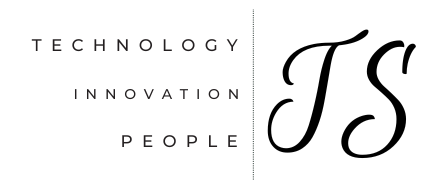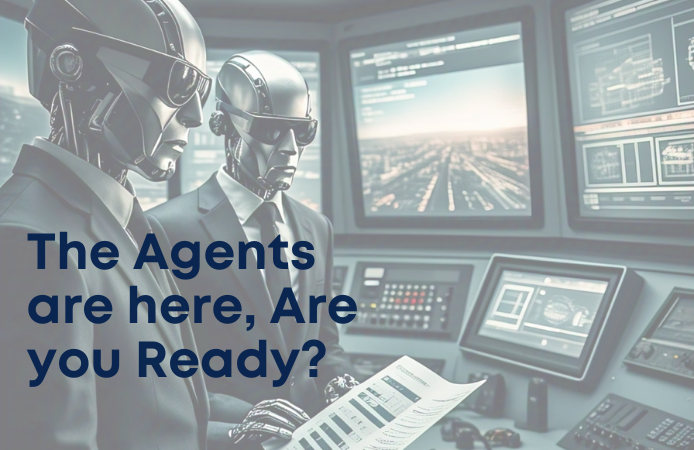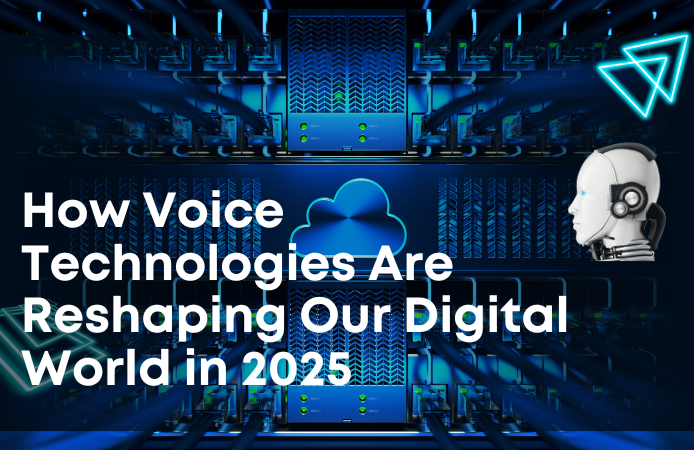Over the past few years, automation technology has grown at an accelerated pace, and today we are witnessing a pivotal moment in the evolution of work.
Initially, companies relied on Robotic Process Automation (RPA) to handle simple, repetitive tasks like data entry and invoice processing. RPA acted like a basic robot, following a fixed set of rules, but it lacked the ability to learn or adapt when things changed. We saw the evolution of enterprise tools like Processmaker, PowerApps (from Microsoft), and UIPath, and for individuals and SMBs we saw tools like Zapier, Make.com (Integromat), PipeDream etc
Thanks to the power of big data, improved computing, and smarter machine learning, a new type of automation—agentic AI—has emerged. These smart helpers learn from experience, make their own decisions, and work alongside humans, marking the beginning of true augmentation in the workplace, as highlighted by the WEF Workplace Report of 2025. (see here)

Just as the year 2025 began, we have a couple of tech leaders describing the year in terms of AI Agents. Some of these leaders have painted a vivid picture of this transformation in different ways. Microsoft CEO, Satya Nadella, warned that traditional SaaS apps might “collapse” as AI takes over business logic, remarking that “all the logic will be in the AI tier” and that we are “entering the next innings of this AI platform shift.” Meanwhile, Salesforce CEO, Marc Benioff, touted the rise of “digital labour,” explaining that their new Agentforce 2.0 can halve customer-support requests, saving companies time and money. At the same time, Meta’s Mark Zuckerberg, has pointed to a future where personalised AI agents transform business applications by tailoring services to individual needs.
Other voices, such as Mihir Shukla of Automation Anywhere and Zhiwei Jiang of Capgemini Australia, emphasise that we are only in the early stages—”the second innings”—of AI’s true potential, where these agents will soon drive major business model changes and boost productivity. Together, these insights confirm that agentic AI is set to reshape our world, not by replacing human workers but by enhancing our capabilities and making work more exciting, efficient, and creative.
Now, let us dive deep into the concepts.
Understanding Robotic Process Automation (RPA): The Foundation of Automation
Automation refers to the use of technology to execute tasks with minimal human oversight. Robotic Process Automation (RPA) marked the initial foray into automating business processes. It refers to the use of software robots to perform repetitive, rule-based tasks. RPA became popular for its ability to handle structured data and execute pre-defined workflows efficiently.
So, think of the approvals you request from your office, e.g., a request for leave or approval for materials. Of course, applying for a loan at your local bank also goes through an approval process. And when the process is not automated, you now know why you experience delays. 😊 😊
While RPA excelled at automating mundane operations, it lacked essential cognitive, i.e., intelligent capabilities. RPA systems typically followed strict scripts without understanding the context, which limited their effectiveness in situations where adaptability was needed. However, this was fine as it removed the need for physically moving files and folders from desk to desk.
Enter AI Automation: A Step Forward
Traditional AI automation introduced more sophisticated technologies such as machine learning (ML) and natural language processing (NLP). These advancements allowed systems to process unstructured data, comprehend language, and make decisions informed by learnt patterns.
With traditional AI applications, we saw the rise of chatbots in customer service and predictive analytics guiding business strategies. However, these systems still faced constraints, often limited to addressing specific tasks rather than exhibiting true intelligence.
Characteristics of Automation Systems
| Feature | Description |
| Predefined Sequences | Automation typically operates based on fixed rules and predefined sequences, often facilitated by tools which automate workflows across applications. |
| Repetitive Task Focus | It is geared towards executing routine processes, like data entry or report generation, primarily using Robotic Process Automation (RPA) platforms |
| Efficiency Enhancement | Automation enhances productivity by performing tasks faster than manual methods, improving operations in sectors like manufacturing |
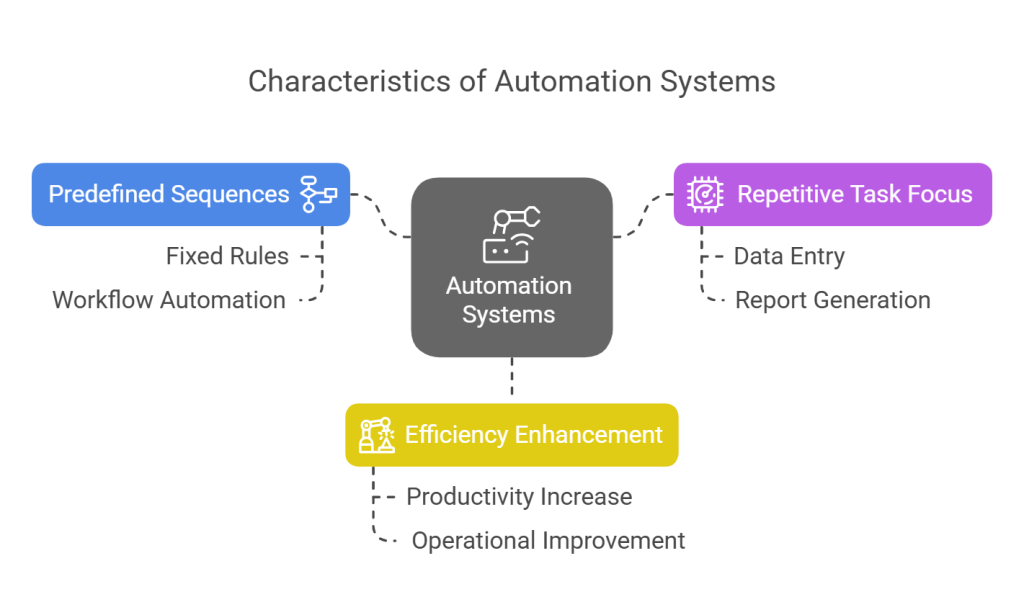
Soma sample RPA platforms and products include Zapier or Integromat (now make.com), PipeDream; enterprise tools like Nintex, UiPath, Processmaker, and Blue Prism. We also have tools such as Siemens MindSphere for industrial automation.
So what then is Agentic AI?
At its core, Agentic AI refers to artificial intelligence that acts with a level of autonomy, or “agency,” to carry out tasks independently. It can make decisions, find opportunities, adapt to changes, and loop in human teams when necessary.
Agentic AI represents a paradigm shift towards machines that can operate autonomously, learning and adapting to new information in real time. This innovative class of AI combines autonomous decision-making with advanced learning capabilities, allowing for a more integrated approach to automation.
Sample Tools:
OpenAI: Offers powerful AI models, such as ChatGPT, which can engage in conversation, generate content, and assist in decision-making processes. Microsoft Azure AI: Provides a range of AI services that allow businesses to develop scalable agentic AI applications incorporating tools for speech recognition, decision-making, and more. Newer tools like n8n, proprietary tools like PowerAutomate
We are however seeing a fusion between RPA tools and AI agents, where RPA platforms are adding agent features to their toolkit so as not to be left behind in the race.
Features of Agentic AI
| Feature | Description |
| Perception | Ability to observe and perceive their surroundings. |
| Decision-making | Makes autonomous decisions based on environmental context. |
| Learning | Improves performance through interactions and experiences. |
| Adaptability | Adjusts actions based on feedback and changing conditions. |
| Complex Interactions | These AI agents are designed to engage in human-like interactions, enhancing customer experiences and operational efficiencies. |

Key Advancements Driving the Evolution from RPA to AAI
You may wonder why the buzz and need for agentic AI, while we were just getting used to process automation. Well, many things have been happening behind the scenes that have informed these decisions also. And you know technology will never remain static. Some of the several factors that have driven the shift from RPA to agentic AI
- Data Explosion: The increase in data availability has enabled intelligent algorithms to uncover patterns that manual systems could not detect.
- Enhanced Algorithms: Advances in machine learning algorithms, particularly deep learning, have empowered AI systems to analyse complex data efficiently.
- Computing Power: Significant improvements in computing capabilities, including cloud infrastructure, allow AI systems to process vast amounts of data in real time.
- Integration of Technologies: The advent of hybrid solutions, combining RPA with AI, has led to smarter and more flexible automation systems.
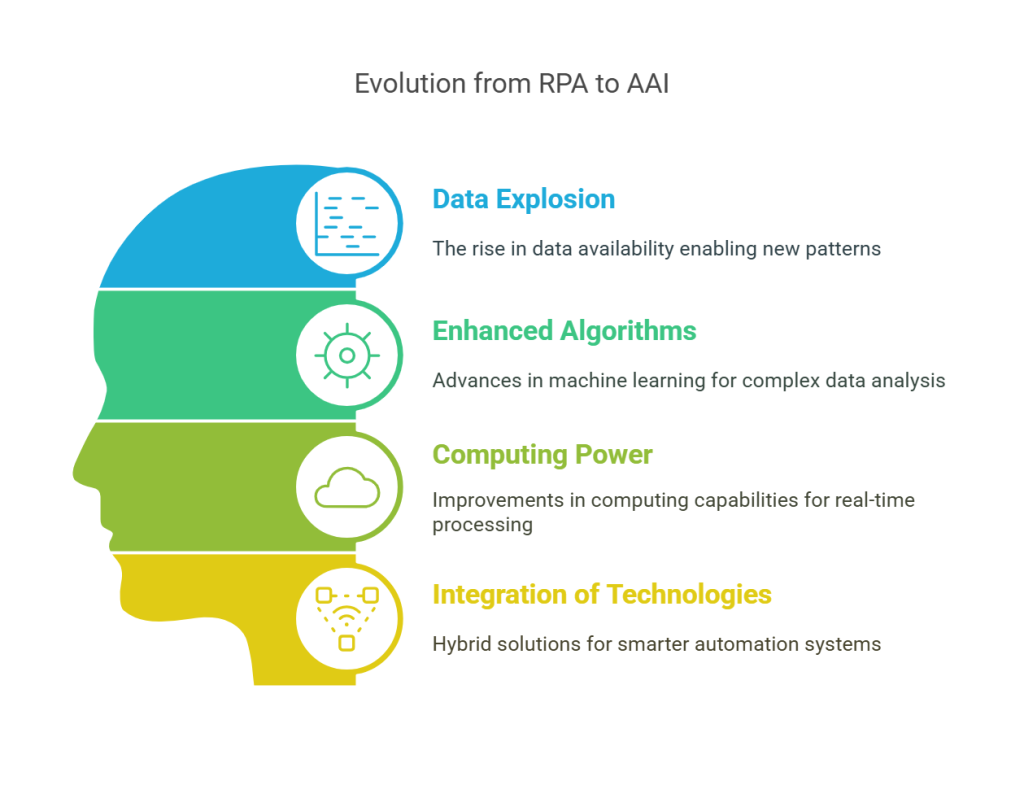
The journey from RPA to agentic AI illustrates a remarkable evolution in automation technology, emphasising the shift toward enhanced intelligence, adaptability, and autonomy. As these systems become more integrated into everyday business processes, organisations that embrace this transformation will benefit from improved efficiency, better decision-making, and the ability to navigate ethical challenges. The future lies in intelligent automation driven by agentic AI, marking a significant milestone in how we work and interact with technology.
By ‘Tosin Shobukola
Tosin Shobukola is a seasoned leader in Enterprise Technology Solutions and business innovation, with over 17 years of experience across multiple industries. Currently leading ApreeCourt Solutions, he crafts innovative solutions driving Digital Transformation, Artificial Intelligence and Data Analytics. His tenure at Microsoft saw him revolutionise cloud solutions, saving clients significant costs. As the founder of Analytics Africa (a Social Enterprise company), he fosters talent and inclusivity in data analytics. With diverse interests including hosting a podcast and community service, Tosin is a thorough-bred professional with global impact, who embodies excellence and innovation, poised to propel organizations to unparalleled success.
